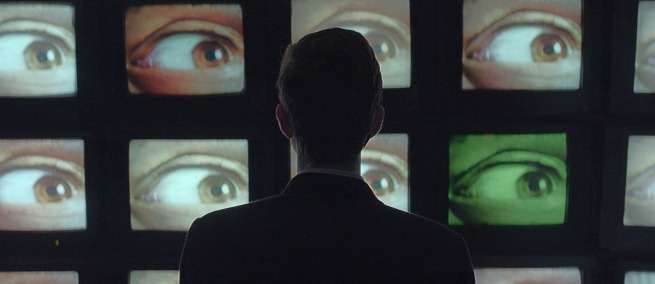
THE ANTENNA, Turkish writer/director Orçun Behram’s debut feature, is a dystopian, chilling, horror film set in a nameless town in Turkey. It made its world premiere at the 2019 Toronto International Film Festival where we sat down with Behram. THE ANTENNA centers on an apartment building’s superintendent, and begins as he supervises the installation of a new satellite antenna which promises to deliver a central television broadcast into each home. It’s an ominous beginning when the satellite’s installer falls off the roof to his death, and from then on things get worse—the satellite dish begins oozing lethal black tar throughout the building. THE ANTENNA stars Ihsan Önal, Gül Arici, Murat Saglam, and Elif Cakman.
Science & Film: The film has a negative stance in relation to new technology, which leads me to wonder: what do you think of the Internet?
Orçun Behram: Wow, I have things to say about that. The film is a bit critical of the act of creating imagery. It is based on simulation theory, [which says that] the images that you create feed back into reality, and then you have a constant loop and completely loose reality. This is a pessimistic idea. In that regard, the Internet is something that is just speeding up this phenomenon. We are changing our relationship to the real. But also, it is an incredible tool that is shifting the world, and it’s also exciting to see how that shift will be. I have both stances to it, actually.
S&F: The main character in THE ANTENNA is not a particularly heroic figure; he has no more power in the situation than anyone else. How did you develop him?
OB: In the film, almost all of the characters are being affected by what is happening and they don’t have control over it. We don’t have a main character, a chosen one, who has the power to change things—he is going through what everyone else is going through, being victimized by the power of the antenna, of the broadcast, and so on. The character’s decisions seem to matter only in miniscule ways. I didn’t want to show him as a hero. He does have character development, an emotional connection with the girl, but apart from that he’s a weak character and I think it works for what I need to say. I don’t think there is a special way of living that could give you a power against this change.
S&F: Can you say a little more what you mean by this change?
OB: What I was speaking about earlier, this relationship of the real and the image—everyone is affected by it. The real doesn’t exist anymore. In the film, it also happens that there are all these daydream sequences that interweave with reality and the surreality that the media creates is mixing up reality as well. No one is able to resist this situation.

S&F: This idea of a singular broadcast, with an eye towards controlling people’s behavior, creating a “single body” as is said in the film. Did that come out of anything in particular in the world, or other films?
OB: The way that I see it, there are two major allegories in the film. One of them is what I was talking about, simulation theory, and the other one is the link between authoritarian power and the media. This is a major, less philosophical issue. You see this a lot in developing countries, in my country as well; governments are using media to manipulate democracy. Without free press democracies are very vulnerable. In first world countries it is not the governments, it is the corporations that are doing the same thing.
S&F: Would you call this film a horror film?
OB: The film uses horror dynamics, so it could be considered a horror film, but it doesn’t really aim to scare people. I doubt anyone would watch this film and loose sleep. But there is a chiller element to it. My main concern is to tell the story through allegories and through the visuals, not to scare people—but of course I want to keep the emotions up there with music, writing, and sound.
S&F: Do you imagine audiences in different countries reacting differently to the film?
OB: It is hard to tell beforehand how the reaction will be, but I think it will be more personal for Turkish people because of everything that has been going on. But I didn’t want this film to be critical of the government or to be just about the local politics. As I said, I think on different levels this exists in many countries. It’s not just a Turkish issue.
S&F: The visual style and subject matter of the film reminds me of David Cronenberg’s VIDEODROME, was that an inspiration?
OB: Absolutely. I studied film, and I’m influenced by many people. I don’t want to sound pretentious and count all the names, but you learn the poetics of cinema from all the movies that you see. What is dear and close to my heart are horror films because I grew up watching them obsessively. I have this emotional, nostalgic connection to horror films. David Cronenberg, John Carpenter, Wes Craven, all these directors are very special to me.
S&F: What do you like about horror?
OB: It is very nostalgic for me. Also, to scare yourself is an adrenaline rush and a joy. As a little kid, I would go to this dark place just to be scared. Eventually it becomes almost like a fetish because horror cinema has a unique set of rules, it’s repetitive in certain ways, but it becomes beautiful. I think it also creates a huge possibility for symbolism. Horror cinema has always been symbolic, it has always been political—sometimes conservative as well. With all this combined I do enjoy it.
THE ANTENNA is written and directed by Orçun Behram. It will screen next at the London Film Festival in October.
Cover image courtesy of TIFF.
TOPICS